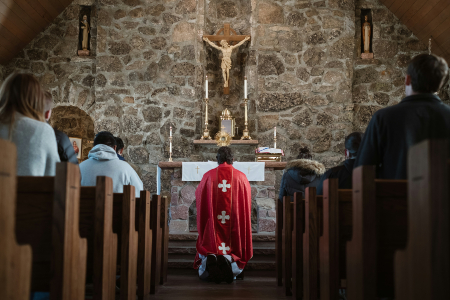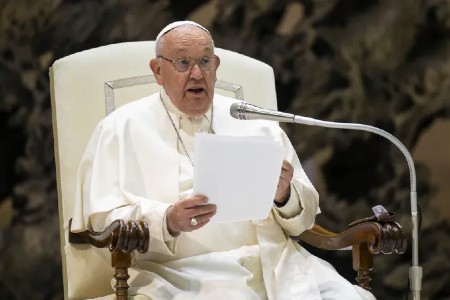John of Ephesus
FREE Catholic Classes
(Also known as JOHN OF ASIA).
The earliest, and a very famous, Syriac historian. He was born at Amida (Diarbekir, on the upper Tigris), about 505; d. about 585. In 529 he was ordained deacon in St. John's monastery of the same city, but on account of his monophysitic doctrine was soon obliged to take refuge in Palestine, where we find him in 534; thence he came to Constantinople, driven from Palestine by the great pestilence of 534-7. In the capital he found a friend in Jacob Baradæus, the organizer of the Jacobite Church ; a protector in Justinian ; and a life-long collaborator in a certain Deuterius. The emperor placed him at the head of the Monophysite community of Constantinople, and soon entrusted him with the mission of converting the heathens of Asia proper and the neighbouring provinces. Eventually John was consecrated (by Jacob Baradæus ), Bishop of Ephesus, the heart of the Monophysite territory, but his official residence, it seems, was always Constantinople. In 546 he helped Justinian to search out and quash the secret practice of idolatry in the capital and its surroundings. Hence his beloved titles of "Teacher of the Heathens", and "Idol-breaker." Soon after Justinian's death (565), John's fortunes began to decline. When the persecution broke out in 571 he was one of its very first victims, and had to suffer imprisonment, banishment, and all sorts of vexations at the hands of the orthodox patriarchs. He soon resigned, in favour of Deuterius, his position as head of the communities he had converted from heathenism, and consecrated Deuterius Bishop of Caria. We do not know where nor exactly when he died, it must have been shortly after 585, for his history comes to an end with that year, and he was then about eighty years of age.
His principal work was an "Ecclesiastical History", from Julius Caesar to A.D. 585. It was divided into three parts of six books each. The first part has entirely perished; of the second part we have copious excerpts in two manuscripts in the British Museum, and possibly the whole of it in the third part of the "Chronicle" of Denys of Tell-Mahre. These excerpts have been edited by Land (Anecdota Syriaca; Leyden, 1868, II, 289-329, 385-390), and translated into Latin by von Douwen and Land (Joannis Episcopi Ephesi, Syri Monophysitae Commentarii de Beatis Orientalibus et Historia Ecclesiasticae fragmenta, Amsterdam, 1889). The third part, which opens with the beginning of the persecution under Justin II (571), has come down to us, though not without some important gaps. There is an edition of it by Cureton (The Third Part of the Ecclesiastical History of John, Bishop of Ephesus, Oxford, 1853), also two translations, one English by Payne Smith (1860), and another in German by Schonfelder (1862). John of Ephesus is also the author of the "Biographies of the Eastern Saints", written at different times and gathered into a "corpus" about 569. They were published by Land (op. et loc. cit., pp. 2-228), and done into Latin by von Douwen and Land (ibid.). Both works are of the greatest importance for the history of the writer's times. He evidently strove to be impartial, for which he is very much to be commended, considering the part he played in the events he related; he is also accurate and full of details. The troubled times in which he wrote the third part of the "History" and his unsettled condition during that period of his life easily explain the disorder and repetitions to be found in the last six books. They account also for the style, which is rude, entangled, and abounds with Greek words and phrases; besides, we must not overlook the fact that the water spent most of his life outside the zone of spoken Syriac.
 Hi readers, it seems you use Catholic Online a lot; that's great! It's a little awkward to ask, but we need your help. If you have already donated, we sincerely thank you. We're not salespeople, but we depend on donations averaging $14.76 and fewer than 1% of readers give. If you donate just $5.00, the price of your coffee, Catholic Online School could keep thriving. Thank you. Help Now >
Hi readers, it seems you use Catholic Online a lot; that's great! It's a little awkward to ask, but we need your help. If you have already donated, we sincerely thank you. We're not salespeople, but we depend on donations averaging $14.76 and fewer than 1% of readers give. If you donate just $5.00, the price of your coffee, Catholic Online School could keep thriving. Thank you. Help Now >
Join the Movement
When you sign up below, you don't just join an email list - you're joining an entire movement for Free world class Catholic education.
-

-
Mysteries of the Rosary
-
St. Faustina Kowalska
-
Litany of the Blessed Virgin Mary
-
Saint of the Day for Wednesday, Oct 4th, 2023
-
Popular Saints
-
St. Francis of Assisi
-
Bible
-
Female / Women Saints
-
7 Morning Prayers you need to get your day started with God
-
Litany of the Blessed Virgin Mary
U.S. Catholic Parishes Experience Resurgence of Traditional Practices
-

Pope Francis Urges Faith and Prayers for Peace
-

Florida Welcomes Volunteer Chaplains to Public Schools
-
10 Fascinating Details About St. Joseph the Worker: Celebrating His Feast Day - May 1
-
St. Joseph the Worker: Model for Men, Young and Old
Daily Catholic
 Daily Readings for Thursday, May 02, 2024
Daily Readings for Thursday, May 02, 2024 St. Athanasius: Saint of the Day for Thursday, May 02, 2024
St. Athanasius: Saint of the Day for Thursday, May 02, 2024 The Our Father: Prayer of the Day for Thursday, May 02, 2024
The Our Father: Prayer of the Day for Thursday, May 02, 2024- Daily Readings for Wednesday, May 01, 2024
- St. Marculf: Saint of the Day for Wednesday, May 01, 2024
- To Saint Peregrine: Prayer of the Day for Wednesday, May 01, 2024
We ask you, humbly: don't scroll away.
Hi readers, it seems you use Catholic Online a lot; that's great! It's a little awkward to ask, but we need your help. If you have already donated, we sincerely thank you. We're not salespeople, but we depend on donations averaging $14.76 and fewer than 1% of readers give. If you donate just $5.00, the price of your coffee, Catholic Online School could keep thriving. Thank you.Help Now >
![]()
Copyright 2024 Catholic Online. All materials contained on this site, whether written, audible or visual are the exclusive property of Catholic Online and are protected under U.S. and International copyright laws, © Copyright 2024 Catholic Online. Any unauthorized use, without prior written consent of Catholic Online is strictly forbidden and prohibited.
Catholic Online is a Project of Your Catholic Voice Foundation, a Not-for-Profit Corporation. Your Catholic Voice Foundation has been granted a recognition of tax exemption under Section 501(c)(3) of the Internal Revenue Code. Federal Tax Identification Number: 81-0596847. Your gift is tax-deductible as allowed by law.








 Daily Readings for Thursday, May 02, 2024
Daily Readings for Thursday, May 02, 2024 St. Athanasius: Saint of the Day for Thursday, May 02, 2024
St. Athanasius: Saint of the Day for Thursday, May 02, 2024 The Our Father: Prayer of the Day for Thursday, May 02, 2024
The Our Father: Prayer of the Day for Thursday, May 02, 2024
